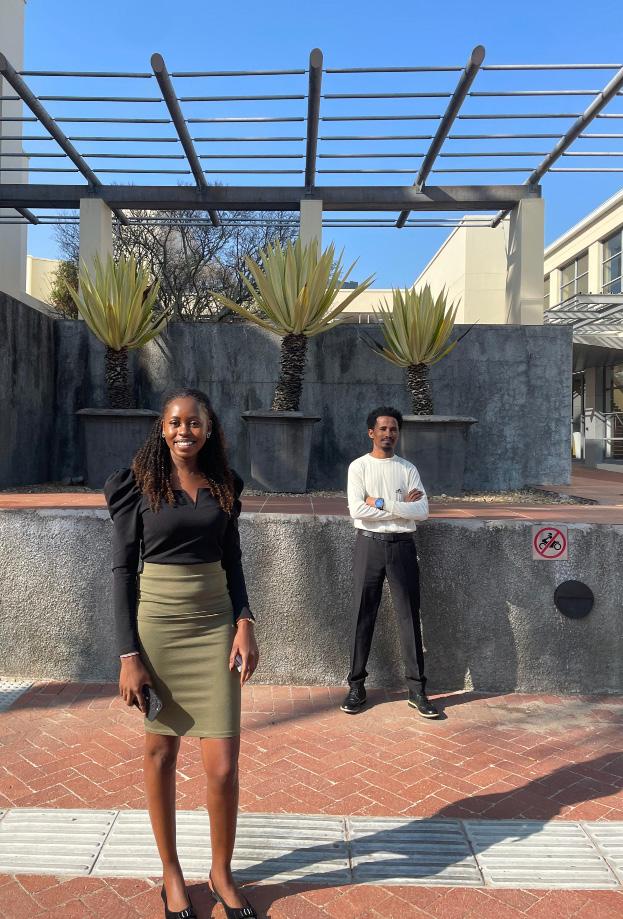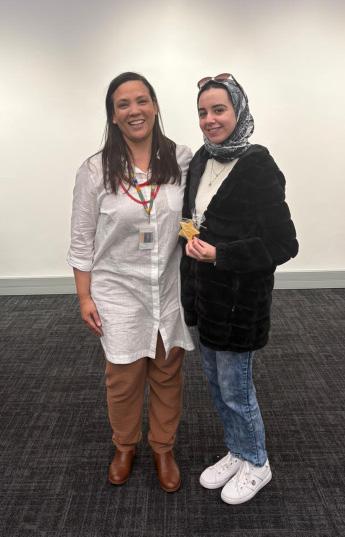
4 minute read
SHAPING AFRICA’S FUTURE LEADERS
Transformative Leadership Training
Empowers African STARS Fellows
Apart of the African STARS Fellowship Programme, the Leadership and Core Skills Training Week prompted fellows to step outside their comfort zones and enhance their selfconfidence. Held from August 25-29, the week focused on essential leadership topics –including leadership identity, emotional intelligence, resilience, mentoring, accountability, and growth mindset. Fellows engaged in group discussions and practical exercises, culminating in individual pitches at the end of the week.
The opening sessions invited fellows to reflect on their leadership identities, drawing from diverse personal and professional experiences in research, entrepreneurship, and community engagement. “This diversity greatly enriched our discussions on the role of leadership and the values of effective leaders,” said Prof Lenine Liebenberg, the week’s coordinator. Co-facilitator Dr Bethlehem Tefera added that fellows openly examined how their unique experiences shaped both their strengths and challenges in how they lead. “They discussed them boldly, and used the session to navigate and deepen their understanding of their leadership identity,” she noted.
Building on this foundation, Mrs Lewin Moodley introduced Emotional Intelligence (EI). Fellows explored tools such as selfawareness, self-regulation, and the ABCDE model. “These do not take root immediately but deepen through mindfulness and interaction,” she explained. By midweek, fellows were already applying EI principles in practice. “Conversations became more reflective, psychological safety increased, and collaboration strengthened,” noted Lewin. “The fellows could readily articulate how they had grown and how their perspectives had changed –reinforcing the fact that Emotional Intelligence is not a one-time lesson but a continuous practice.”
The programme also featured a keynote by Prof Kanshu Rajaratnam, who shared his journey from engineering to finance to leading the School for
LEFT: African STARS fellows
Celestine Kemunto Nyamari and Kajelcha Fikadu Tufa.
RIGHT: Prof Lenine Liebenberg with fellow Laila Oulad Belayachi.

Data Science at Stellenbosch University, set against financial uncertainties, geographic changes, political turmoil and a global pandemic. Despite many context-specific strategies, his central theme of connection resonated most. “He emphasised that collaboration and trust foster resilience, innovation, and impactful change,” said Lenine. Inspired, one fellow reflected: “I aspire to be a collaborative leader… empathetic but firm.”
Later in the week, Lenine reframed mentorship as reciprocal, rooted in accountability and trust, and supported by a mentorship agreement template. Lewin complemented this with her own story of reframing failure as growth, encouraging fellows to adopt a mindset where setbacks fuel resilience. In the Accountability Session, this perspective prompted a shift from blame to ownership, with fellows leaving “more mature and action-oriented.”
The focus then turned to entrepreneurial leadership. Dr Yaw Bediako stressed the role of entrepreneurial scientists in linking research and innovation for Africa’s development, a theme expanded by Dr Anton du Preez van Staden, who shared practical strategies from his own journey. Fellows embraced the complementarity of science and entrepreneurship in health innovation.

The week concluded with Capstone presentations, in which fellows described their identities as leaders – including their values, their strengths, and their purpose. “They noted specific challenges that hamper their goal attainment, and set out an action plan for progress within the next 6-12 months – committed to holding themselves and their peers accountable for these action plans that translate their new skills into action,” explained Lenine. “These presentations were a living demonstration of leader development,” she continued. Many described the week as transformative, noting the power of introspection in shaping leadership identity.
Overall, the programme equipped fellows with the mindset, skills, and confidence to lead in African science. “Their reflections echo the programme’s aims: fellows left inspired, accountable, and committed to building resilient teams, institutions, and innovations that serve Africa’s future,” concluded Lenine.










